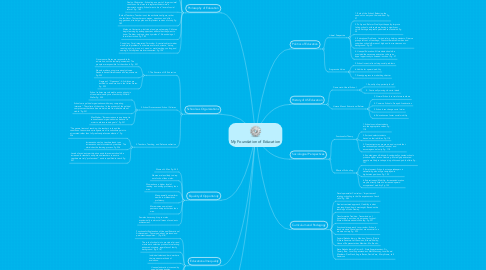
1. Philosophy of Education
1.1. Progressive Pragmatism- "Finding processes that work in order to achieve the desired ends." Pg. 186
1.2. Key Researchers: George Sanders Pierce, William James, John Dewey
1.3. Generic Notations: Attainment of a better society through education.School is an "embryonic community" where students learn skills from books and experiences. Goal is to learn to work cooperatively in a democratic society. Pg. 187
1.4. Goals of Education: Schooling as a part of larger societal conditions. Goal was to integrate students into a democratic society. School was to be a "lever of social reform" Pg. 189
1.5. Role of Teachers: Teacher is not the authoritarian figure, rather the facilitator. The teacher encourages, questions, and offer suggestions, also helps plan and implement courses of study. Pg. 189
1.6. Method of Instruction: Individual and group learning. Children begin learning by asking questions about what they want to know,"Problem-solving or inquiry method". Abandoning of formal instruction. Pg. 189
1.7. Curriculum: Core/ integrated Curriculum. A central subject matter would yield problems in other areas of math, science, history, reading, writing, music, art, wood or metal working,cooking, and sewing. all disciplines are interconnected. Pg. 190
2. Equality of Opportunity
2.1. Women Vs. Men Pg. 343
2.2. Women are less likely to drop out of school than males.
2.3. Women have a higher level of reading and writing proficiency than men.
2.4. Men generally outperform women in mathematics proficiency.
2.5. More women now attend post-secondary institutions than men.
2.6. Females have caught up to males academically in almost all areas of academic achievement.
3. Politics of Education
3.1. Liberal Perspective
3.1.1. 1. Role of the School- Balancing the needs of society and the individual. Pg. 27
3.1.2. 2. Policy and Reform- Quality with equality. Improve failing schools, with teachers having a significant voice. Setting acceptable performance standards. Pg. 30
3.1.3. 3. Educational Problems- Limited role in helping students; Diverse groups left out of teachings; Drastic differences in urban and suburban schools & areas of high and low socioeconomic background. Pg. 29
3.1.4. 4. Unequal Education- All students should be provided the necessary education to have an equal opportunity to succeed in school. Pg. 27
3.2. Progressive Vision
3.2.1. 5. School is central to solving social problems
3.2.2. 6. Vehicle for upward mobility
3.2.3. 7. Steady progress to make things better
4. Schools as Organizations
4.1. 1. The Structure of US Education
4.1.1. Governance- States are responsible for education, not the federal government. The people are responsible for the schools. Pg. 221
4.1.2. Schools are becoming increasingly diverse. Students have different needs and requirements. Pg. 222
4.1.3. Degree of "Openness"- All children are entitled to an education in the Unites States. Pg. 223
4.2. 2. School Processes and School Cultures
4.2.1. School cultures are vulnerable and continuity is often maintained by use of authority- Willard Waller Pg. 230
4.2.2. Schools are political organizations with many competing interests." The culture of the school is the product of the political compromises that have bee made in order to make the school viable."Pg. 231
4.2.3. Max Weber- "Bureaucracies are an attempt to rationalize and organize human behavior in order to achieve certain goals." Pg. 231
4.3. 3. Teachers, Teaching, and Professionalization
4.3.1. "The general status of teaching, the teacher's role and the condition of transmission arrangements of its subculture point to a truncated rather than fully realized professionalization." Pg. 236
4.3.2. Increased control on teachers leads to an increased control of students by teachers. This diminishes the learning process. Pg 236
4.3.3. Levels of academic participation and achievement should be increased for teachers and potential teachers to ensure teachers are truly "professional" and are qualified to teach. Pg. 237
5. Curriculum and Pedagogy
5.1. Developmentalist Curriculum- "Importance of relating schooling to the life experiences of each child" Pg. 284
5.2. Student centered approach, flexibility in what was taught and how it was taught.Based on the teachings of John Dewey
5.3. Transformative Tradition- Transmission of knowledge is not the only purpose of school. More multidimensional schooling. Pg. 297
5.4. Functionalist approach to curriculum- Schools teach students the values that are essential to a modern society. Pg. 292
5.5. Federal Stakeholders in Madison County (District 5) State Senators- Jeff Sessions, Richard Shelby; House of Representatives Member- Mo Brooks;
5.6. State Stakeholders in District 5- State Superintendent- Dr. Tommy Bice; Local Superintendent- Matt Masssey; Local Board Members- Dan Nash, Angie Bates, David Vess, Mary Stowe, Jeff Anderson
6. History of US Education
6.1. Democratic-Liberal School
6.1.1. 1. Equality of opportunity for all
6.1.2. 2. Continually moving closer to ideals
6.2. Horace Mann's Educational Reform
6.2.1. 3. Normal Schools to train future teachers
6.2.2. 4. Common Schools- Free public education
6.2.3. 5. Schools can change social order
6.2.4. 6. Education can foster social mobility
7. Sociological Perspectives
7.1. Functionalist Theory
7.1.1. 1. Schools socialize students into the appropriate values. Pg. 118
7.1.2. 2. Sort and select students based on their abilities. Pg 118
7.1.3. 3. Create structures, programs, and curricula that are technically advanced, rational, and encourage social unity. Pg. 118
7.2. Effects of Schooling
7.2.1. 4. Knowledge and Attitude- Academically oriented schools produce higher rates of learning. More highly educated people are likely to take part in politics and public affairs. Pg. 121
7.2.2. 5. Employment- Schools act as gatekeepers in determining who will get employed in high-status positions. Pg. 122
7.2.3. 6. Education and Mobility- Increased education may be directly linked to increased upward occupational mobility. Pg. 123
